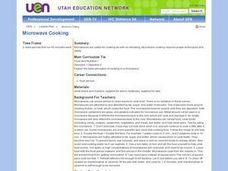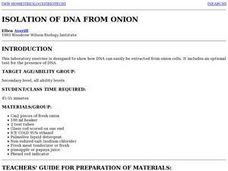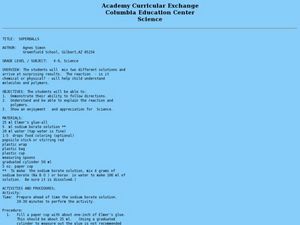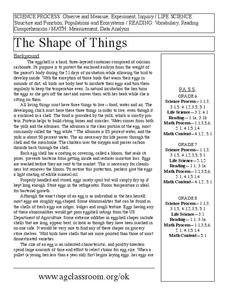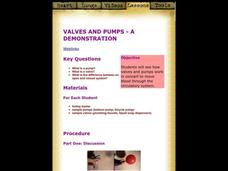Curated OER
Microwave Cooking
Students learn the basic principles of microwave cooking and prepare a dessert in the microwave using correct procedures.
Curated OER
Weather or Not (Cloud Formation/Condensation)
Students investigate the formation of clouds and rain in this experiment. They decide how dust in the air helps to make clouds form and how dust helps meteorologists make forecasts.
Curated OER
Observing the Effect of a Change in Conditions on a System at Equilibrium by Applying Le Chatelier's Principle
Young scholars describe the Le Chatelier Principle. They participate in an experiment in which they observe the changes in an equilibrium system. They answer discussion questions to end the lesson.
Curated OER
The Shape of Things
Students study the natural incubation of hens and the important characteristics of the egg shell. They perform experiments to test the strength of the dome shape of an egg and prove that an eggshell has pores to allow air to pass. ...
Curated OER
ISOLATION OF DNA FROM ONION
Young scholars perform a laboratory exercise designed to show how DNA can easily be extracted from onion cells. They conduct an optional test for the presence of DNA using standard lab equipment.
Curated OER
Pioneer Kitchen
In this pioneer worksheet, students read a short passage about different ways of pioneer cooking. Students then find 12 given words in the word search provided.
Curated OER
Superballs
Students mix two different solutions to become more familiar with molecules and polymers. In this chemistry lesson, students decide whether or not the reaction between two solutions is chemical or physical. Students then observe the...
Curated OER
What Happened To The Chesapeake Bay Filtering System?
In this Chesapeake Bay instructional activity, students read a dialogue between 2 people about what had happened to the Chesapeake Bay filtering system, and answer short answer questions about it. Students complete 4 questions.
Curated OER
The Shape of Things
Students explore dome shape construction. In this dome shape construction lesson, students explore the history, strength, and endurance of the dome shape design.
Curated OER
Ranking Salinity
Students explain the uses of titration in chemistry and in industry. In this chemistry lesson, students determine the concentration of an unknown solution using titration. They calculate the percent of salt in saline solutions.
Curated OER
Animal Tracks
Students study animals. In this science lesson plan, students make plaster casts of animals that live in the area. Students identify the tracks.
Curated OER
Valves and Pumps - A Demonstration
Students see how valves and pumps work in concert to move blood through the circulatory system.
Curated OER
Taste (Gustation)
Pupils conduct various experiments to see if different parts of the tongue are more sensitive to different characteristics of food.
Curated OER
Making Soap
Students recognize and use chemical indicators in the lab, recognize the need for safety while doing chemical experiments and understand the need for following precise directions.
Curated OER
Density Destiny
Sixth graders measure and investigate the densities of several objects. They, in teams, determine the mass and volume of each of the 5 objects and record the measurements in the data table.
Curated OER
Naturally Speaking
Students identify the Earth's natural resources and classify them as renewable or non-renewable. They simulate the distribution of resources and discuss the fairness and effectiveness of the distribution. They identify ways that they use...
Curated OER
Puzzle Prints
Students explore the basic techniques of printmaking in this introductory instructional activity for the elementary Art classroom. Included with this instructional activity are ideas for successful implementation and step-by-step...
Curated OER
Permeability and Porosity of Somerset County Sediments
Students predict and test the permeability and porosity of sediments in Somerset County, New Jersey. They discuss what how porous they think the sediment of HMS grounds is and why. Students walk around the HMS campus and collect six...
Curated OER
Investigating Monocots and Dicots
Students know about monocotyledons and dicotyledons. They explore the differences between the seed structure of the two by examining bean and corn seeds. They sprout seed to observe the differences in both of their growths.
Curated OER
ReQuest and Motor Imaging with My Side of the Mountain
Fifth graders read "My Side of the Mountain." They create a pantomime using vocabulary words from the story. Students create three questions about the reading. They discuss the passage they read and act out words to help them better...
Curated OER
Handwashing and Sanitation
Learners apply Glo-Germ to their hands to see the amount of germs on their skin. As a class, they watch a demonstration on how to properly watch their hands to prevent the spread of disease. To end the lesson, they are introduced to the...
Curated OER
Potato Lab
In this osmosis worksheet, students put a strip of potato in three different solutions and document the changes in the potato to determine is the solutions were hypotonic, hypertonic, or isotonic. This worksheet has 6 short answer...
Curated OER
Magnetic Discovery Bottle
Young scholars examine how to conduct simple investigations and use simple equipment to gather data. In this magnet lesson students decide what types of objects are attracted to magnets.
Curated OER
Clay Exploration
Students create clay sculptures. In this sculpting lesson, students work in various stations to familiarize themselves with clay and use tools to make their own art piece.
Other popular searches
- Cleaning Water
- Cleaning Dirty Water
- Cleaning Water Experiments
- Sludge Cleaning Water
- Ways Cleaning Dirty Water
- Cleaning an Oil Spill in Water


